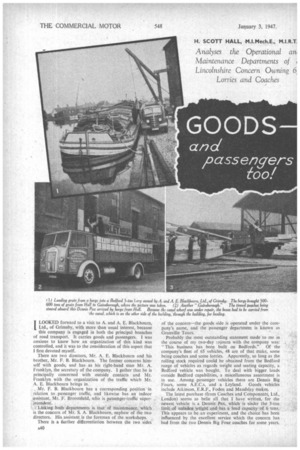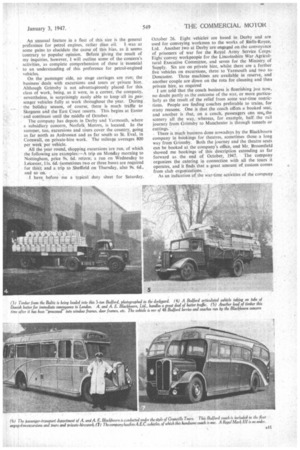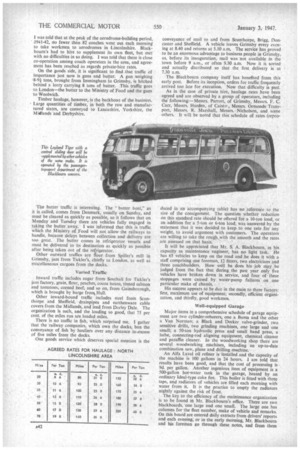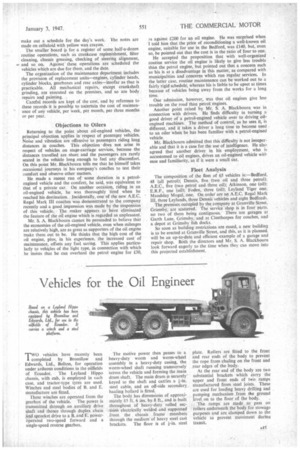GOODS
Page 42

Page 43

Page 44

Page 47

If you've noticed an error in this article please click here to report it so we can fix it.
ILOOKED forward to a visit to A. and A. E. Blackbourn, Ltd., of Grimsby, with more than usual interest, because this company is engaged in both the principal branches of road transport. It carries goods and passengers. I was anxious to know how an organization of this kind was controlled, and it was to the consideration of this aspect that I first devoted myself.
There are two directors, Mr. A. E. Blackbourn and his brother, Mr. F. B. Blackbourn. The former concerns himself with goods, and has as his right-hand man Mr. A. Franklyn, the secretary of the company. I gather that he is principally concerned with outside contacts and Mr. Franklyn with the organization of the traffic which Mr. A, E. Blackbourn brings in.
Mr. F. B. Blackbourn has a corresponding position in relation to passenger traffic, and likewise has an indoor assistant, Mr. F. Broomfield, who is passenger-traffic superintendent.
Linking both departments is that of maintenance, which is the concern of Mr. S. A. Blackbourn, nephew of the two directors. His assistant is the foreman of the workshops. There is a further differentiation between the two sides of the concern—the goods side is operated under the company's name, and the passenger department is known as Granville Tours.
Probably the most outstanding statement made to me in the course of my two-day ,:ojourn with the company was: , " This business has been built on Bedfords." Of the company's fleet of 65 vehicles, 48 are of that make, some being coaches and some lorries. Apparently, so long as the rolling stock required could be obtained from the Bedford range of vehicles as regards weight and seating capacity, a Bedford vehicle was bought. To deal with bigger loads outside Bedford capabilities, a miscellaneous assortment is in use. Among passenger vehicles there are Dennis Big Fours, some A.E.C.s, and a Leyland. Goods vehicles include Atkinson, E.R.F., Foden and Maudslay makes.
The latest purchase (from Coaches and Components, Ltd., London) seems to belie all that I have written, for the newest vehicle is a Dennis Pax, which is tinder the 3-ton lirnit a unladen wet."ght and has a Toad capacity of 6 tons. This appears to be an experiment, and the choice has been influenced by the excellent service which the concern has had from the two Dennis Big Four coaches for some years.
An unusual feature in a fleet of this size is the general
preference for petrol engines, rather than oil. I was at some pains toelucidate the cause of this bias, as it seems contrary to popular opinion. Before giving the result of my inquiries, however, I will outline some of the concern's activities, as complete comprehension of these is essential to an understanding of this preference for petrol-engined vehicles.
On the passenger side, no stage carriages are run; the business deals with excursions and tours or private hire. Although Grimsby is not advantageously placed for this class of work, being, as it were, in a corner, the company, nevertheless, is surprisingly easily able to keep all its passenger vehicles fully at work throughout the year. During the holiday season, of course, there is much traffic to Skegness and the East Coast resorts. This begins at Easter and continues until the middle of October.
The company has depots in Derby and Yarmouth, where a subsidiary concern, Norfolk Motors, is located. In the summer, too, excursions and tours cover the country, going as far north as Ardrossan and as far south as St. Eval, in Cornwall, on private-hire work. The mileage averages 800 per week per vehicle.
All the year round, shopping excursions are run, of which the following are examples:—A trip on Monday morning to Nottingham, price 9s. 6d. return; a run on Wednesday to Leicester, I Is. 6d: (sometimes two or three buses are required for this); and a trip to Sheffield on Thursday, also 9s. 6d., and so on.
have before me a typical duty sheet for Saturday. October 26. Eight vehicles are based in Derby and are used for conveying workmen to the works of Rolls-Royce, Ltd. Another two at Derby are engaged on the conveyance of prisoners of war for the Royal Army Service Corps. Eight convey workpeople for the Lincolnshire War Agricultural Executive Committee, and seven for the Ministry of Supply. Six are on private hire, whilst there are a further five vehicles on excursions, three to Yarmouth and two to. Doncaster. Three machines arc available in reserve, and another couple are down on the rota for cleaning and then private hire, as required I am told that the coach business is flourishing just now, no doubt partly as the outcome of the war, or more particularly as the result of the relief from some war-time restrictions. People are finding coaches preferable to trains, for many reasons. One is that the coach offers a booked seat, and another is that, on a coach, passengers can see, the scenery all the way, whereas, for example, half the rail journey from Grimsby to Manchester is through tunnels or cuttings. . There is much business done nowadays by the Blackbourn company in bcfokings for theatres, sometimes those a long way from Grimsby. Both the journey and the theatre seats can be booked at the company's office, and Mr. Broomfield showed me bookings of this description extending as far forward as the end of October, 1947. The company organizes the catering in connection with all the tours it operates, and it finds that a great amount of custom comes from club organizations. • As an indication of the war-time activities of the company
I was told that at the peak of the aerodrome-building period, ' 1941-42, no fewer than 82 coaches went out each morning to take workmen to aerodromes in -Lincolnshire. Blackboum's had to hire to supplement its own fleet, but met with no difficulties in so doing. I was told that there is close co-operation among coach operators in the area, and agreement has been reached as regards private-hire rates.
On the goods side, it is significant to find that traffic of importance just now is guns and butter. A gun weighing tons, brought from Immingham to Grimsby, is hitched behind a lorry carrying 8 tons of butter. This traffic goes to London—the butter to the Ministry of Food and the guns to Woolwich.
Timber haulage, however, is the backbone of the business.
• Large quantities of timber, in both the raw and manufactured states, are conveyed to Lancashire, Yorkshire. the Midlands and Derbyshire.
The butter traffic is interesting. The "butter boat," as it is called, comes from Denmark, usually on Sunday, and must be cleared as quickly as possible, so it follows that on Monday and Tuesday there are vehicles fully engaged in -taking the butter away, I was informed that this is traffic which the Ministry of Food will not allow the railways to handle, because delays between collection and delivery are too great. The butter comes in refrigerator vessels and must be delivered to its destination as quickly as possible after being taken out of the refrigerator.
Other outward traffics are flour from Spitler's mill in Grimsby, jam from Tickler's, chiefly to London, as well as miscellaneous cargoes from the docks.
Varied Traffic Inward traffic includes sugar from Southall for Tickler's jam factory, grain, flour, peaches, cocoa beans, tinned salmon and tomatoes, corned beef, and so on, from G'ainsborough, which is brought by barge from, Hull.
Other inward-bound traffic includes steel from Scunthorpe and Sheffield, drainpipes and earthenware cable covers from the Midlands, and lead from Darley Dale. The organization is such, and the loading so good, that 75 per cent. of the miles run are loaded miles.
There is no.traffie in fish, which surprised me. I gather that the railway companies, which own the docks, ban the conveyance of fish by hauliers over any distance in4excess of five miles from the docks.
One goods service which deserves special mention is the
conveyance of mail to and from Scunthorpe, Brigg, Doncaster and Sheffield. A vehicle leaves Grimsby every evening at 8.40 and returns at 5.10 a.m. The service has proved to be an enormous advantage to business people in Grimsky, as, before its inauguration, mailwas not available in the town before 9 a.m., or often 9.30 a.m. Now it is sorted and actually distributed so that the first delivery is at 7.30 a.m.
The Blackbourn company itself has benefited from this early post. Before its inception, orders for traffic frequently arrived too late for execution. Now that difficulty is past.
As in the case of private hire, haulage rates have been agreed and are observed by a group of operators, including the following:—Messrs. Parrott, of Grimsby, Messrs. F. C. Garr, Messrs. Hurden, of Caisto,, Messrs. Ormonds Transport, Messrs. R. Marshall, Messrs. Nicholson, and some others. It will be noted that this schedule df rates (repro
duced in an accompanying table) has no reference to the size of the consignment. The question whether reduction on this standard rate should be offered for a 10-ton load, or an addition for a 5-ton or 6-ton load, was answered by the statement that it was decided to keep to one rate for any weight, to avoid argument with customers. The operators are willing to take the rough,with the smooth and the rates are assessed on that basis.
It will be appreciated that Mr. S. A. Blackboum, in his capacity as maintenance engineer, has no light task. He has 65 vehicles to keep on the road and he does it with a staff comprising one foreman, 12 fitters, two electricians and three coachbuiklers. How well he does his job may be judged from the fact that during, the past year only five vehicles have broken down in service, and four of these stoppages were caused by water-pump failures on one particular make of chassis.
His success appears to be due in the main to three factors: first, maximum use of equipment; secondly, efficient organization, and thirdly, good workmen.
Well-equipped Garage
Major items in a comprehensive schedule of garage equipment are two cylinder-reborers, one a Buma and the other a Van Norman; a Black and 'Decker valve-grinder, two sensitive drills, two grinding machines, one large and one small; a 50-ton hydraulic press and small hand press, a lathe, connecting-rod aligning equipment, chemical cleaner and paraffin cleaner. In the woodworking shop there are several woodworking machines, including an up-to-date combination saw, plane and drilling machine. .
An Alfa Laval oil refiner is installed and the capacity of the machine is 100 gallons in 24 hours. I am told that results have been good, and that the cost of processing is 9d. per gallon. Another ingenious item of equipment is a 500-gallon hot-water tank in the garage, heated by an ordinary Ideal-type coke fire. This boiler is fitted with three taps, and radiators of vehicles are filled each morning with water from it. It is the practice to empty the radiators nightly against the risk of frost.
The key to the efficiency of the maintenance organization is to be found in Mr. Blackbourn's office. There are two blackboards, one large and one small. The large one has columns for the fleet number, make of vehicle and remarks. On this board are entered daily extracts from drivers' reports and each evening, or in the early morning, Mr. Blackboum and his foreman go through these notes, and from them make out a schedule for the day's work. The notes are made on celluloid with yellow wax crayon.
The smaller board is for a register of some half-a-dozen routine operations, such as crankcase replenishment, filter cleaning, chassis greasing, checking of steering alignment, and so on. Against these operations are scheduled the vehicles which are due for them, and the date.
The organization of the maintenance department includes the provision of replacement units—engines, cylinder heads, cylinder blocks, gearboxes and rear axles—insofar as that' is practicable. All mechanical repairs, except crankshaft grinding, are executed on the premises, and so are body repairs and painting.
Careful records are kept of the cost; and by reference to these records it is possible to ascertain the cost of maintenance of any vehicle, per week, per month, per three months or per year.
Objections to Oilers
Returning to the point about oil-engined vehicles, the principal objection applies in respect of passenger vehicles. Noise and vibration are offensive to passengers riding long distances in coaches. This objection • does not arise in respect of vehicles on stage-carriage services, because the distances travelled are short and the passengers are rarely seated in the vehicle long .enough to feel any discomfort. On this point Mr. Blackbourn tells me that he himself takes occasional journeys in his company's coaches to test their comfort and observe other matters.
He made a recent run of some duration in a petrolengined vehicle and the comfort, he said, was equivalent to that of a private car. On another occasion, riding in an oil-engined vehicle, he was thoroughly tired when he reached his destination. Incidentally, one of the new A.E.C. Regal Mark III coaches was demonstrated to the company recently and a good impression was made by the suspension of this vehicle. The maker appears to have eliminated the feature of the oil engine which is regarded as unpleasant. Mr. S. A. Blackbourn cannot be persuaded to believe that the economies of the oil-engined vehicle, even when mileages are relatively high, are as great as supporters of the oil engine make them out to be. He thinks that the high cost of the oil engine, plus, in his experience, the increased cost of maintenance, offsets any fuel saving. This applies particularly to vehicles of the light type, in connection with which he insists that he can overhaul the petrol • engine for 00, against /200 for an oil engine. He was surprised when I told him that the price of reconditioning a well-known oil engine, suitable for use in the Bedford, was £140. but, even so, he pointed out that the cost is in the ratio of four to one.
He accepted the proposition that with well-organized routine service the oil engine is likely to give less trouble than the petrol engine, but pointed out that a concern such as his is at a disadvantage in this matter, as compared with municipalities and concerns which run regular services. In the latter case, routine maintenance can be worked out to a fairly -rigid schedule, whereas his is liable to be upset at times because of vehicles being away from the works for a long time.
One admission, however, Was that oil engines give less trouble on the road than petrol engines.
Another point raised by Mr. S. A. Blackbourn was in connection with drivers. He finds difficulty in turning a good driver of a petrol-engirted vehicle over to driving oilengined machines. The method of control, as he sees it, is different, and it takes a driver a long time to become used to an oiler when he has been familiar With a petrol-engined vehicle.
Mr. Blackbourn admitted that this difficulty is not insuperable and that it is a case for the use of intelligence. He also agreed that another driver in his employment, who is accustomed to oil engines, drives an oil-engined vehicle with ease and familiarity, as if it were a small car.
Fleet Analysis The composition of the fleet of 65 vehicles is:—Bedford, 48 (all petrol); Dennis, five (two oil and three petrol): A.E.C., five (two petrol and. three oil); Atkinson, one (oil): E.R.F., one (oil); Foden, three (oil); Leyland Tiger one; Maudslay Mogul, one. On orderare an A.E.C. Regal Mark III, three Leylands, three Dennis vehicles and eight Bedfords.
The premises occupied by the company at Granville Street_ Grimsby, are scattered. The service shop is in four parts. no two of them being contiguous. There are garages at Garth Lane, Grimsby, and at Cleethorpes for coaches, and a depot at Grimsby fish docks. So soon as building restrictions are eased, a new building is to be erected at Granville Street, and this, as it is planned, will be an up-to-date and efficient example of a garage and repair shop. Both the directors and Mr. S. A. Blackbourn look forward eagerly to the time when they can move into this projected establishment.




































































